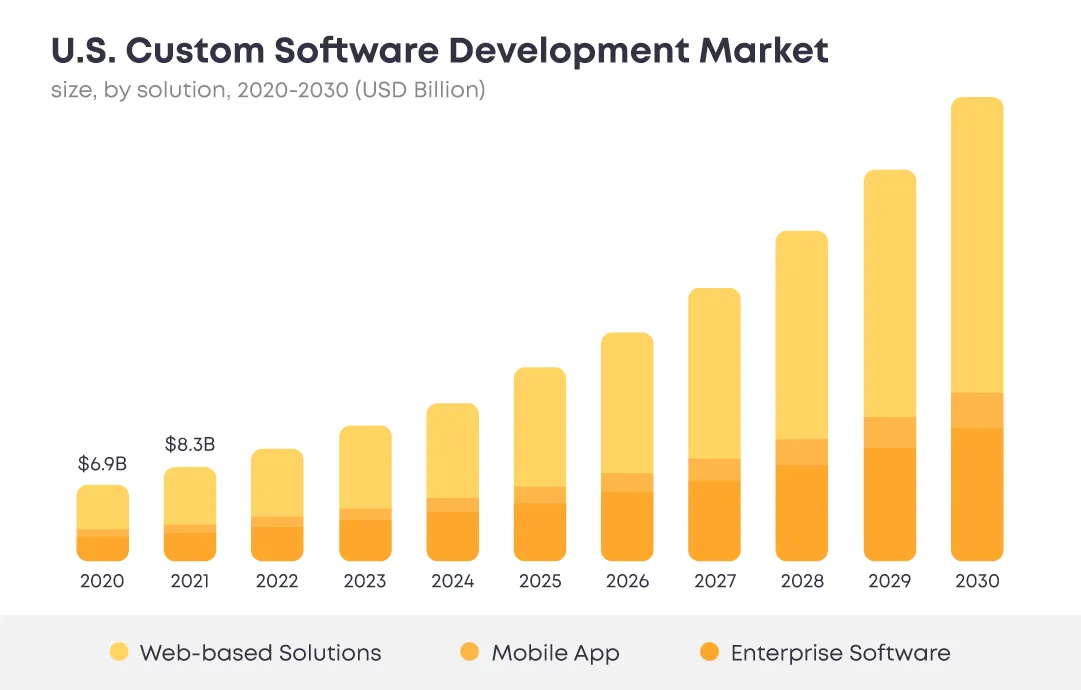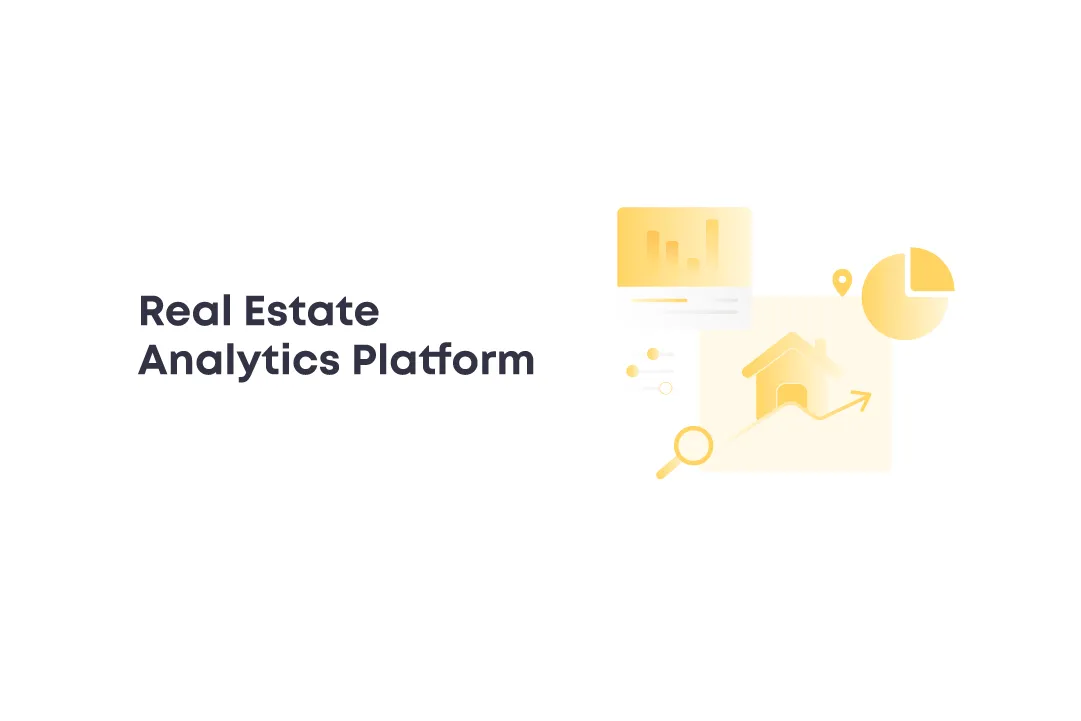Dynamic real estate market requires businesses to act fast and effectively. Having software that can automate most of your business and management-related tasks is a wise choice. When it comes to deploying a real estate analytics platform, you need to decide between two approaches — custom software and ready-made solutions.
Today’s technology offers lucrative features for real estate, like 3D tours, interactive maps, advanced search, chatbots, etc., that encourage businesses to turn to unique, custom-made technology products. However, custom development is not always the best option. When you start building your reputation in the real estate marketplace, you may need a ready-to-deploy platform to quickly gain clients and raise profits.
In this article, we’ll discuss the pros and cons of both solutions to help you decide which choice best suits your business.
Custom Software Development vs. Ready-Made Platforms
Different aspects of your business, such as your company’s budget, the number of qualified IT and security specialists, and the ability to host your own infrastructure, play a role in your decision. A customized real estate analytics platform can be a more practical option if your business is well-established on the market, you have an available budget for development, and the skilled staff to maintain hardware and software.
On the other hand, an off-the-shelf platform can save you lots of time and resources, especially when you are not yet ready to afford customized software or the functionality of the existing solution is sufficient for your current business needs.
Ready-Made Platforms
If you are just starting in the real estate business, you can opt for an affordable real estate analytics platform that already exists on the market without hefty investments. However, this approach also has its benefits and drawbacks. Check them out:

Advantages of ready-made platforms:
Lower costs compared to custom software development
Purchasing an off-the-shelf real estate analytics platform costs less compared to a custom one. Plus, you can pay in installments and choose the subscription plan you want.
Regular updates and bug fixes supported by the vendor
The software vendor usually offers free system updates.
Disadvantages of ready-made platforms:
Integrations with third-party systems
Moreover, it might be complicated to integrate your existing real estate analytics platform with other third-party systems, or such integrations can require additional assistance.
Redundant features
Some features you pay for might not pay off as users don’t use them as much or need them.
Little or no control over data
Using a ready-made analytics platform means that your data is stored on the third-party vendor’s servers. In case of any security issues, such as data exposure, you won’t be able to fix the problems from your own side.
Custom Software Development
Many businesses prefer setting up software from ground up rather than using existing solutions. This allows you to choose the needed functionality without overpaying for features you won’t use, and have control over your data. Yet custom development requires fewer costs and quite a time before the software will be deployed. Let’s weigh the key pros and cons:

Advantages of custom software development:
Exact functionality your business requires
A customized real estate analytics platform can be designed according to your business goals, ensuring that software offers the functionality your clients expect.

Consider hiring a software development partner who can comprehensively analyze your business processes and provide full-cycle services from design and development to ongoing support of your analytics platform. This can relieve your IT team’s workload and to be a more financially rewarding solution in the long term.

No need to adapt to the capabilities of ready-made platforms
As your real estate business grows, you may need to scale your operations to handle a larger volume of transactions and data, and building your own real estate analytics platform allows you to design it with scalability in mind.
Instead of getting a fixed set of features and adopting your processes to them, you can ask a dedicated development team to incorporate new features or update the system at any given point.
Own a product that can be sold as a SAAS solution
As you get complete ownership of your custom analytics platform, it can be monetized and sold as a SAAS solution to other partners. This can help your company increase market reach, boost revenue, and find new alliances in the field.

Disadvantages of custom software development:
High upfront investments
Initial investments might be high as a number of diverse specialists are engaged in developing a tailored analytics platform. These costs pay off if the potential return on investment overpasses expenses, but it can be difficult for the company at the start.
Look at what factors can influence the price:
| Software size | Adding more screens to your app increases its cost. |
| Supported platforms | Software that supports multiple platforms (like iOS and Android) is more expensive than web-based solutions. |
| UI/UX | The price can vary depending on how many design elements you want your platform to have. |
| Infrastructure | Your chosen technology stack affects your project price. The price of chosen infrastructure can vary from 500$ to infinity per month. |
| Maintenance and support | Even if your application is successful, your product always needs ongoing maintenance and technical support to ensure you go hand in hand with changing requirements. |
Risk of selecting a vendor that doesn’t match your expectations
If you choose a vendor that can’t meet your requirements or fail to provide you with the quality of features and service you expect, you risk losing your budget and not meeting your clients’ needs.
Time is needed until you can install and use the solution
Typically, developing MVP may take around several months. Then the product can be launched in order to gather users’ feedback and update the existing project.
Look at three stages of software development with an approximate estimated timeline:
| Requirements and design | from 2 weeks |
| Building MVP | around 3 months |
| Testing | approximately 3 weeks |
Here’s expert advice from Ihor Kosandyak, Lead Engineer at ORIL:
Startups that have a new business idea should create a platform from ground up with its own feature set. This will help companies attract users who will like the unique capabilities of their product.
For startups, consider creating an MVP product to get user feedback faster.
For mid-sized companies that want to improve their product, I recommend developing from ground up rather than improving what already exists. Big companies often have quality apps that were made long ago and based on outdated technologies. Redeveloping such a product is usually time-consuming and more expensive than creating a new one using progressive technologies.
For enterprises that do not have their own product, it’s worth writing from scratch. They have a proper budget that will allow them to create a quality application.
Examples of Ready-Made Real Estate Analytics Platforms
Real estate analytics platform is software that can analyze complex and large data sets and visualize this information to provide real estate companies with actionable insights. Realtors, property investors, owners, and other parties can make informed decisions about
- What property is worth investing in?
- When is the best time to sell or buy a property?
- How to distribute marketing resources to target the right clients, and more
Check out some examples of real estate analytics platforms that are available on the market:
Cherre allows real estate professionals to make insight-driven decisions, giving access to accurate property market data.
TopHap is a real estate tech company that provides real estate agents, investors, sellers, and buyers with easy access to high-quality analytics.
Near empowers real estate players to make smart decisions and reach the right audience using actionable data insights on client behavior.
RealNex combines the most effective technology tools into one comprehensive system that supports real estate professionals throughout the deal cycle.
ORIL Expertise
At ORIL, we developed multiple custom products for real estate. One of the recent successful projects was the listing platform that simplifies buying and selling processes and lets buyers and sellers make the best deals.
What were the client’s challenges?
The client with years of experience in real estate approached our team to help turn their revolutionary idea into life. The client wanted to develop a real estate application to fully automate buying and selling real estate. As no existing solution could fulfill the client’s requirements, we determined to create an app from scratch.
What ORIL team has done
Our professionals implemented the following functionality into this app:
- Listing of available real estate properties for sale
- Signing online agreements
- Document storage
- Review of all offers by a seller or agent
- Submission of client offers along with prices for properties (evaluating what amount of money a person is ready to spend on a particular property)
Final Thoughts
No one can tell you which option is best as no solution ideally fits all businesses. Whether it’s better to create a real estate analytics platform from ground up or use an existing solution depends on your many business’s requirements, organization of internal processes, and financial capacities. The more you’re informed about all advantages and disadvantages of both options, the better the final decision you will come up with.
Good luck!







